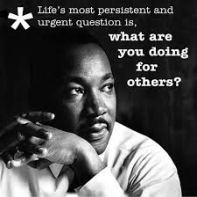 “Injustice anywhere is a threat to justice everywhere. We are caught in an inescapable network of mutuality, tied in a single garment of destiny. Whatever affects one directly, affects all indirectly. Never again can we afford to live with the narrow, provincial “outside agitator” idea.” (Martin Luther King Jr. )
“Injustice anywhere is a threat to justice everywhere. We are caught in an inescapable network of mutuality, tied in a single garment of destiny. Whatever affects one directly, affects all indirectly. Never again can we afford to live with the narrow, provincial “outside agitator” idea.” (Martin Luther King Jr. )
Today, Americans observe Martin Luther King Jr. Day. It’s a federal holiday, so many people will enjoy a long weekend, with schools, banks, courts and all federal offices closed.
King was the inspiration of millions, being integral to the Civil Rights Movement of the 1950s and ‘60s. During the 1963 March on Washington, he gave hope to all who felt less than free in America with his uplifting “I Have a Dream,” speech which earned him a reputation as one of the greatest orators in American history.
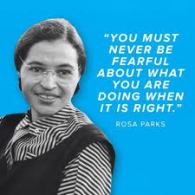 In 1964, then President Lyndon B. Johnson signed the landmark Civil Rights Act that outlawed discrimination based on race, color, religion, sex, or national origin. That same year, King received the Nobel Peace Prize for combating racial inequality through nonviolence.
In 1964, then President Lyndon B. Johnson signed the landmark Civil Rights Act that outlawed discrimination based on race, color, religion, sex, or national origin. That same year, King received the Nobel Peace Prize for combating racial inequality through nonviolence.
King was planning a national occupation of Washington, D.C., to be called the Poor People’s Campaign, when he was assassinated by James Earl Ray, in Memphis, Tennessee, on April 4, 1968.
“We know through painful experience that freedom is never voluntarily given by the oppressor; it must be demanded by the oppressed.” (MLKjr)
After his death, he was awarded the Presidential Medal of Freedom and the Congressional Gold Medal. Soon after, labour unions in contract negotiations began to campaign for a holiday, Martin Luther King Jr. Day , in his honour. In 1971, the day was established as a holiday in numerous cities and states
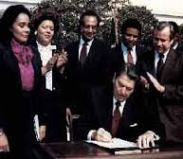 President Ronald Reagan signed a bill designating the third Monday in January to honour King in 1983, but it was not observed until three years later. It is a floating holiday, in that it is celebrated around the time of King’s birthday, January 15. In 1986, the day became a U.S. federal holiday.
President Ronald Reagan signed a bill designating the third Monday in January to honour King in 1983, but it was not observed until three years later. It is a floating holiday, in that it is celebrated around the time of King’s birthday, January 15. In 1986, the day became a U.S. federal holiday.
Interestingly, Reagan originally opposed the holiday, citing cost concerns.
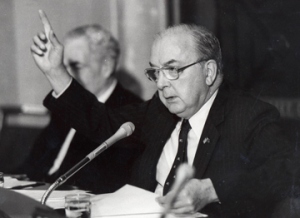 “Senators Jesse Helms and John Porter East (both North Carolina Republicans) led opposition to the bill and questioned whether King was important enough to receive such an honor. Helms criticized King’s opposition to the Vietnam War and accused him of espousing “action-oriented Marxism” Helms led a filibuster against the bill and on October 3, 1983, submitted a 300-page document to the Senate alleging that King had associations with communists. New York Senator Daniel Patrick Moynihan declared the document a “packet of filth”, threw it on the Senate floor and stomped on it “ Wikipedia.com)
“Senators Jesse Helms and John Porter East (both North Carolina Republicans) led opposition to the bill and questioned whether King was important enough to receive such an honor. Helms criticized King’s opposition to the Vietnam War and accused him of espousing “action-oriented Marxism” Helms led a filibuster against the bill and on October 3, 1983, submitted a 300-page document to the Senate alleging that King had associations with communists. New York Senator Daniel Patrick Moynihan declared the document a “packet of filth”, threw it on the Senate floor and stomped on it “ Wikipedia.com)
In 1994, Congress designated the King Holiday as a national day of service. But some states resisted observing the holiday, an action that would seem directly opposed to King’s ‘dream.” It was not until 2000 that the day was officially observed in all 50 states.
Many politicians still active in government today voted against the holiday. In October 1983, Senate Judiciary Committee Chairman Chuck Grassley of Iowa and Senate Finance Committee Chairman Orrin Hatch of Utah, former GOP presidential nominee John McCain of Arizona, and Richard Shelby of Alabama, were amongst the 22 opposing votes against 78 Senators in favour, along with the current House Appropriations Committee Chairman Hal Rogers of Kentucky, and current top Republican advocate in defense of the Voting Rights Act, Rep. Jim Sensenbrenner of Wisconsin.
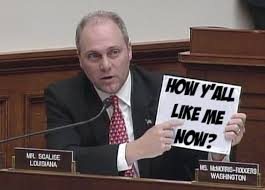 Majority Whip Steve Scalise, a Republican from Louisiana, voted twice against a state version of the holiday. Which is not surprising, considering that it has recently become known that Scalise delivered a previously unreported speech at a 2002 conference sponsored by a white-supremacist group. He was one of three Louisiana statehouse members who voted against the proposal in 1999, and then one of three nay-sayers in 2004.
Majority Whip Steve Scalise, a Republican from Louisiana, voted twice against a state version of the holiday. Which is not surprising, considering that it has recently become known that Scalise delivered a previously unreported speech at a 2002 conference sponsored by a white-supremacist group. He was one of three Louisiana statehouse members who voted against the proposal in 1999, and then one of three nay-sayers in 2004.
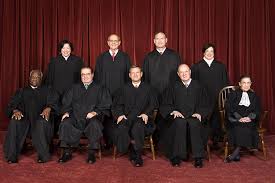 “The U.S. Supreme Court ruled 5-4 in June 2013 that a key provision of the 1965 Voting Rights Act designed to prevent racial discrimination in certain voting laws was no longer necessary. The majority opinion, authored by Chief Justice John Roberts and joined by Justices Antonin Scalia, Anthony Kennedy, Clarence Thomas and Samuel Alito, stated that “things have changed dramatically” in the South and that the “country has changed” since the Voting Rights Act was passed. The court argued the law had successfully defended against discrimination, but was no longer needed. Racism, the court majority appeared to suggest, was over, and laws created during a time when such hatred was in its heyday served now to place unjust “burdens” on certain states and jurisdictions that wished to pass new voting laws — laws, of course, that had nothing to do with trying to suppress minority votes. “ (Huffington Post)
“The U.S. Supreme Court ruled 5-4 in June 2013 that a key provision of the 1965 Voting Rights Act designed to prevent racial discrimination in certain voting laws was no longer necessary. The majority opinion, authored by Chief Justice John Roberts and joined by Justices Antonin Scalia, Anthony Kennedy, Clarence Thomas and Samuel Alito, stated that “things have changed dramatically” in the South and that the “country has changed” since the Voting Rights Act was passed. The court argued the law had successfully defended against discrimination, but was no longer needed. Racism, the court majority appeared to suggest, was over, and laws created during a time when such hatred was in its heyday served now to place unjust “burdens” on certain states and jurisdictions that wished to pass new voting laws — laws, of course, that had nothing to do with trying to suppress minority votes. “ (Huffington Post)
“An unjust law is a code that a numerical or power majority group compels a minority group to obey but does not make binding on itself. This is difference made legal. By the same token, a just law is a code that a majority compels a minority to follow and that it is willing to follow itself. This is sameness made legal. Let me give another explanation. A law is unjust if it is inflicted on a minority that, as a result of being denied the right to vote, had no part in enacting or devising the law.” (MLKjr)
And so today, Americans celebrate a holiday honouring a man instrumental in the creation of the Civil Rights Act that outlawed discrimination based on race, color, religion, sex, or national origin, while SCOTUS – which consists of a non-elected Chief Justice of the United States and eight associate justices who are nominated by the President and confirmed by the Senate for life tenure “unless they resign, retire, take senior status, or are removed after impeachment (though no justice has ever been removed)” (Wikipedia.org) – dismantle that act to protect the very states that impelled it’s necessity.
“How does one determine whether a law is just or unjust? A just law is a man-made code that squares with the moral law or the law of God. An unjust law is a code that is out of harmony with the moral law. To put it in the terms of St. Thomas Aquinas: An unjust law is a human law that is not rooted in eternal law and natural law. Any law that uplifts human personality is just. Any law that degrades human personality is unjust.” (MLKjr)
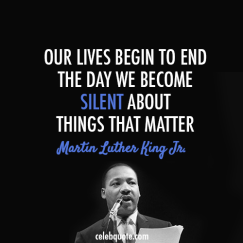 King’s words ring as true today as they did in this 1967 speech he gave at Stanford University. The “Other America” still exists, and will continue to do so until more people, universally, demand social equality and human rights for all.
King’s words ring as true today as they did in this 1967 speech he gave at Stanford University. The “Other America” still exists, and will continue to do so until more people, universally, demand social equality and human rights for all.
